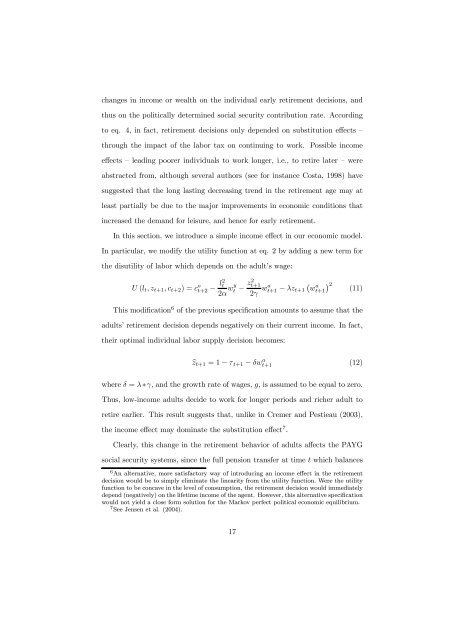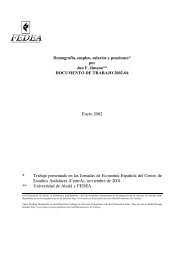The Evolution of Retirement by J. Ignacio Conde-Ruiz* Vincenzo ...
The Evolution of Retirement by J. Ignacio Conde-Ruiz* Vincenzo ...
The Evolution of Retirement by J. Ignacio Conde-Ruiz* Vincenzo ...
You also want an ePaper? Increase the reach of your titles
YUMPU automatically turns print PDFs into web optimized ePapers that Google loves.
changes in income or wealth on the individual early retirement decisions, and<br />
thus on the politically determined social security contribution rate. According<br />
to eq. 4, in fact, retirement decisions only depended on substitution effects —<br />
through the impact <strong>of</strong> the labor tax on continuing to work. Possible income<br />
effects — leading poorer individuals to work longer, i.e., to retire later — were<br />
abstracted from, although several authors (see for instance Costa, 1998) have<br />
suggested that the long lasting decreasingtrendintheretirementagemayat<br />
least partially be due to the major improvements in economic conditions that<br />
increased the demand for leisure, and hence for early retirement.<br />
In this section, we introduce a simple income effect in our economic model.<br />
In particular, we modify the utility function at eq. 2 <strong>by</strong> adding a new term for<br />
the disutility <strong>of</strong> labor which depends on the adult’s wage:<br />
U (l t ,z t+1 ,c t+2 )=c o t+2 − l2 t<br />
2α wy t − z2 t+1<br />
2γ wa t+1 − λz t+1<br />
¡<br />
w<br />
a<br />
t+1<br />
¢ 2<br />
(11)<br />
This modification 6 <strong>of</strong> the previous specification amounts to assume that the<br />
adults’ retirement decision depends negatively on their current income. In fact,<br />
their optimal individual labor supply decision becomes:<br />
bz t+1 =1− τ t+1 − δw a t+1 (12)<br />
where δ = λ∗γ, and the growth rate <strong>of</strong> wages, g, is assumed to be equal to zero.<br />
Thus, low-income adults decide to work for longer periods and richer adult to<br />
retire earlier. This result suggests that, unlike in Cremer and Pestieau (2003),<br />
theincomeeffect may dominate the substitution effect 7 .<br />
Clearly, this change in the retirement behavior <strong>of</strong> adults affects the PAYG<br />
social security systems, since the full pension transfer at time t which balances<br />
6 An alternative, more satisfactory way <strong>of</strong> introducing an income effect in the retirement<br />
decision would be to simply eliminate the linearity from the utility function. Were the utility<br />
function to be concave in the level <strong>of</strong> consumption, the retirement decision would immediately<br />
depend (negatively) on the lifetime income <strong>of</strong> the agent. However, this alternative specification<br />
would not yield a close form solution for the Markov perfect political economic equilibrium.<br />
7 See Jensen et al. (2004).<br />
17






